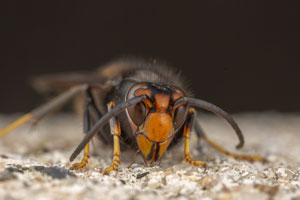Asian giant hornets, also known as “murder hornets” have certainly made their presence known in the past few months. After being sighted in the Pacific Northwest, this hornet has struck fear in the heart of many nationwide. As the largest hornet in the world, it’s easy to understand why! Their sting is known to be potentially fatal, but the true threat they pose is to the honeybee population. Thankfully, these Asian giant hornets have yet to be spotted in El Paso. Regardless, it’s important to stay aware of the threats they pose, and the team at Pest Defense Solutions is here to share the facts.
Are Murder Hornets as Dangerous as Everyone’s Saying?
Asian giant hornets are definitely the most threatening of their kind. The biggest concern scientists have is the fact that they are a big predator to honeybees and hives. A single murder hornet can kill dozens of honeybees in minutes, and a group of 30 hornets can devour a hive of nearly 30,0000 bees in hours. If these hornets were to have a bigger presence in the states, the honeybee population would be in severe danger.
But what about their stings? Like many stinging insects, the Asian giant hornet will not attack humans unless they feel provoked or threatened. Their stings contain neurotoxins and are extremely painful. If someone is stung multiple times, the neurotoxins can cause organ failure and eventual death.
What Does a Asian Giant Hornet Look Like?
If you came across one of these hornets, you’d know it wasn’t your ordinary stinging insect! Here’s how to tell them apart:
- Workers are 1 ½ – 2” in length while queens can exceed 2”
- Light orange head with an orange, black, and brown striped body.
- Large, prominent eyes
- Distinctly sharp mandibles
- Six legs and a set of antennae
- ¼” (6 mm) length stinger
Should You Worry About Murder Hornets in Texas?
Right now, no. As mentioned earlier, there are no current sightings of these anywhere in America besides Washington state. Scientists are currently leading the way to find, trap, and eradicate this pest before it becomes more widespread. In any case, it’s always best to enlist the help of a licensed pest control company for any type of stinging insect.


